Meet the world’s most STUBBORN family: How reclusive couple refuse to sell land to developers as newbuild homes sprout up around them… despite jaw-dropping offers
A stubborn family that refused to sell their land for new homes now lives in the middle of an extensive residential area.
In scenes reminiscent of the Pixar film Up, the Zammit family home in Sydney stands out from the crowd with its 200-metre expanse of pristine lawn and enormous exterior, as row after row of identical houses surround it.
Developers are lining up with huge cash offers to entice the owners of the spectacular house to move and let the bulldozers in, but they refuse to budge.
The imposing mansion at The Ponds, in Sydney’s northwest, sits on highly sought-after land and could make its owners millionaires if they finally give in.
Experts are putting the price tag on the property at a whopping $60 million (£30 million) in Australia’s booming property market, but the rebellious family is refusing to sell.
Their beautiful home sits on 1.99 acres and has a majestic, 200-foot-long Windsor Castle-style driveway that runs through the enormous lawn to the front door
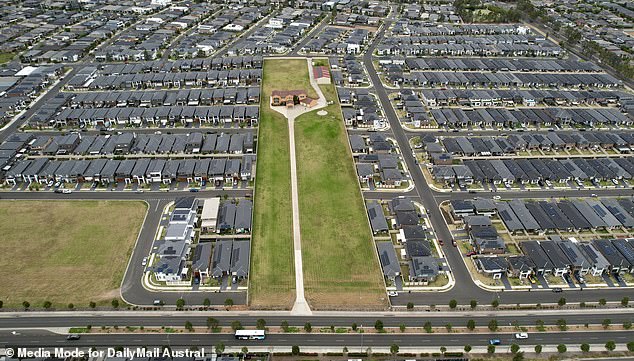
The sprawling mansion on Hambledon Road, in The Ponds, in Sydney’s northwest, is at the center of a large development, with rows of dozens of identical houses next to the five-acre estate.
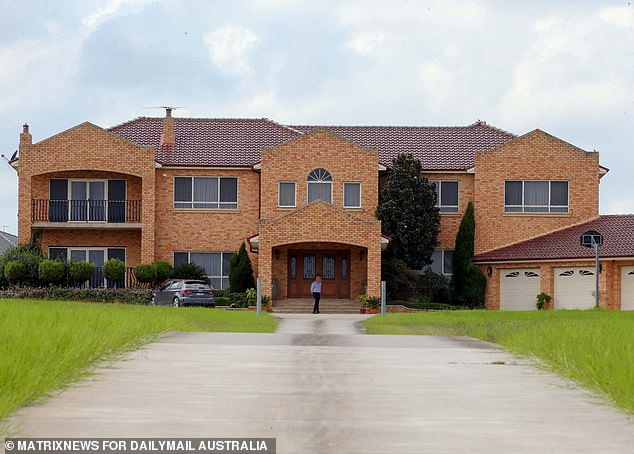
Neighboring plots of land sold for up to $239/m² in 2012, which would have valued the Zammits’ five-hectare estate at around $4.75 million a decade ago
The Windsor Castle-style driveway is 200 meters long, while the house also has a huge barn to the rear and a three-car garage.
It also offers views over the scenic Blue Mountains and is approximately a 40-minute drive from Sydney’s central business district.
The Zammits have already turned down offers from developers reportedly as high as $40 million (£20 million) – and every day there are new requests from real estate agents asking the family to call them in their relentless search for the property.
When MailOnline visited the house this week, there were business cards from potential agents and buyers lining the front door, with handwritten pleas asking the family to get in touch.
Among them was local estate agency Cutcliffe, who confirmed they had yet to speak to the Zammit’s but were keen to discuss a possible sale.
Aerial photographs show how the area around the house – once the green fields on the edge of the city – has now been swallowed up by homes.
Developers simply built around it, and dozens of families with barely enough space to kick a football now share a border fence with the vast tract of land.
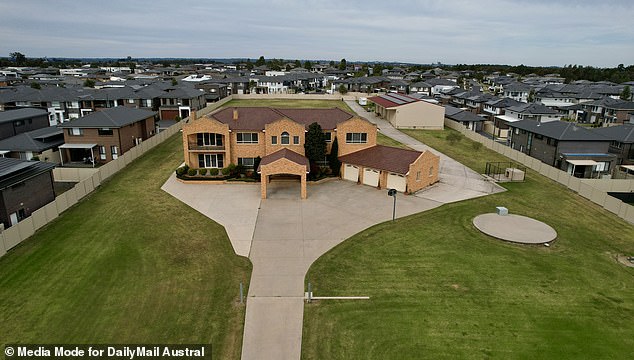
The Zammit family has rejected offers from developers reportedly as high as $40 million
But neighbors who lived next door to the Zammits said they had no problem with the family refusing to sell.
“It doesn’t really bother us,” said one father.
“It’s their land, they can do whatever they want with it.”
Another woman who lived across the street had a similar opinion.
“If I owned that property, I would do the same thing,” the mother said.
“I’m with them!”
The intensely private family has shed all interest in their country, and mother Diane Zammit refused to say anything when we visited her at home this week.
Residents of the close-knit community said the family was quiet and mostly kept to themselves, rarely enjoying their vast estate other than keeping the acres of lawn perfectly trimmed.
Despite the enormous appreciation now given to the house, it briefly appeared on the market for a basement bargain less than a decade ago.
Neighboring plots of land sold for up to $239/sq m in 2012, which would have valued the Zammits’ 20,000 sq m estate at around $4.78 million a decade ago.
But for seven days in November 2015, it was suddenly put up for sale with a list price of just $858,000 to $945,000, real estate records on RP Data show.
In February 2016, the house was offered for sale again at the same price list, but was taken off the market after just a week.
It is no longer mentioned.
The Zammites have previously admitted that the country is unrecognizable from the moment they moved in 16 years ago.
Ms Zammit told Daily Mail Australia two years ago: ‘The farmland used to be dotted with small red-brick houses and cottages.
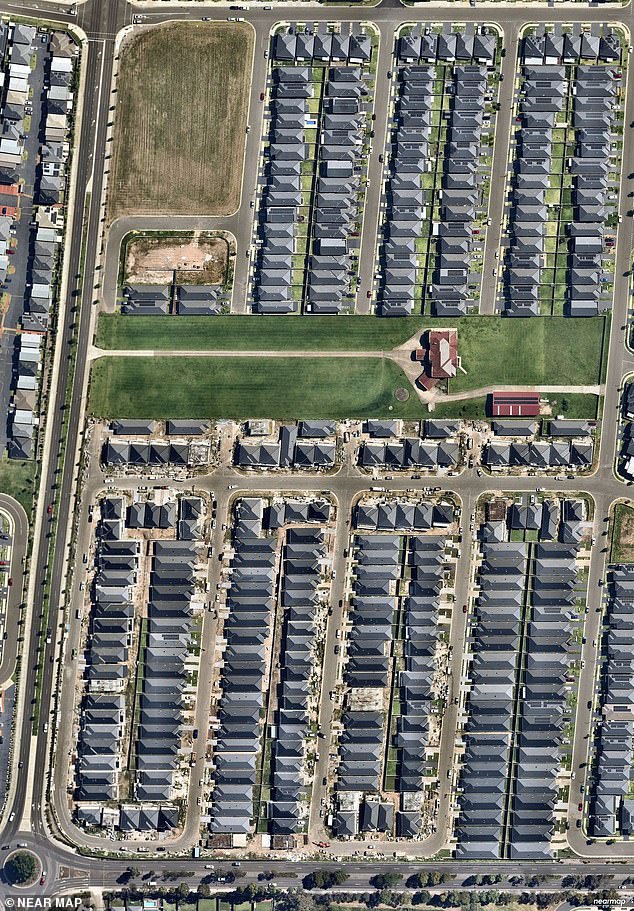
The Zammit’s property is believed to have more than five bedrooms and features a large triple garage for the family’s cars, including a classic Ford Falcon XR6, and a basketball court.
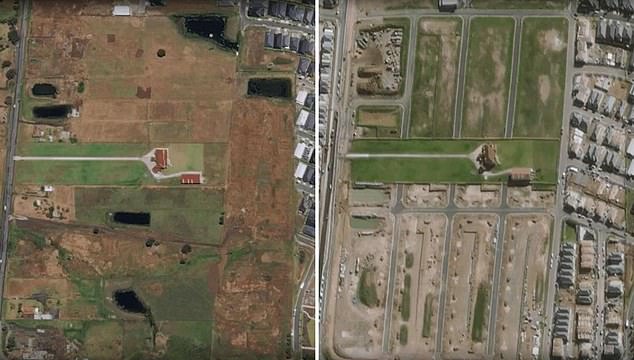
Developers gradually brought up the surrounding plots of land, but the intensely private Zammit family refused to sell
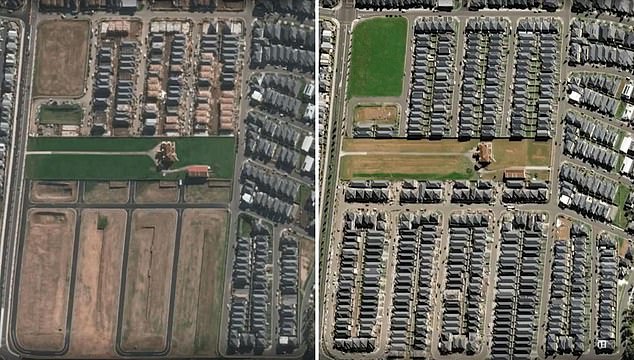
The family has refused to disclose the offers made to them by developers for the property
‘Each home was unique and there was so much space, but not anymore. It’s just not the same.’
Other homes in the adjacent development are selling for about $1.5 million.
The Zammit’s property is believed to have more than five bedrooms and features a large garage for the family’s cars – including a classic Ford Falcon XR6 – in addition to a makeshift basketball court.
A small enclosure for their two dogs was also seen, but despite the vast amount of land, the property doesn’t have luxuries like a swimming pool or a tennis court, or even a single tree or shrub.
Mowing the gigantic but neatly manicured lawn takes about two and a half hours, with the couple’s young son regularly taking on the task, neighbors say.
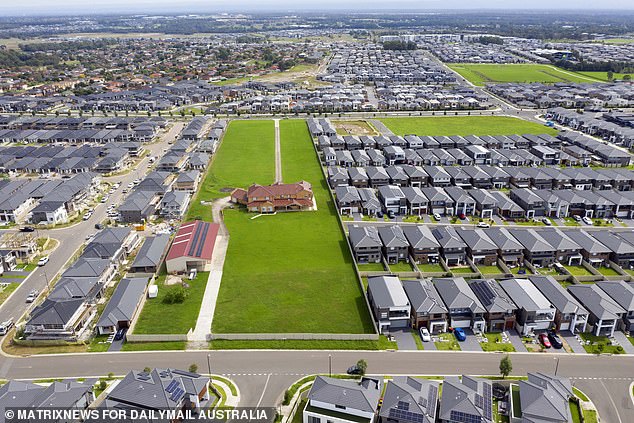
The current valuation is almost unimaginable, but the land is worth more than $40 million to local developer Bathla, who could squeeze 40 new $1 million homes into the space.
The house is surrounded by approximately 750 meters of fencing to contain the burgeoning and ongoing construction work around them.
There’s no clear indication why the family has rejected all offers to sell so far, but every day they hold out the price tag rises.
“The land is probably worth about $60 million if it were developed now,” said a local real estate analyst, who estimated the block could fit 40 new homes.
“Even if someone paid them $40 million for it, the developer would make at least $20 million.
“And given the way house prices in Sydney continue to rise, even a $60 million price tag would leave the developer with a substantial profit by the time the houses were eventually approved, built and sold.
“They must really love that house to ignore that kind of money.”
